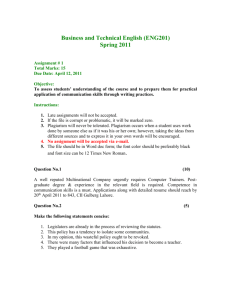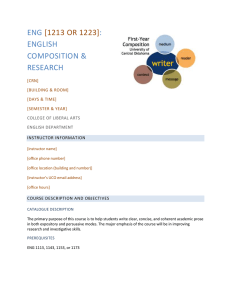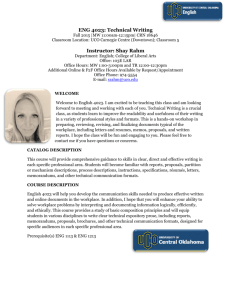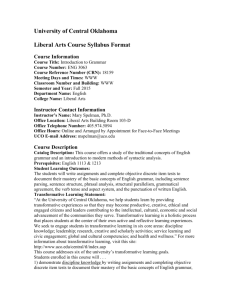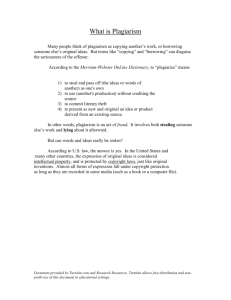HIST 5910 – History of Popular Amusement in the United States
advertisement
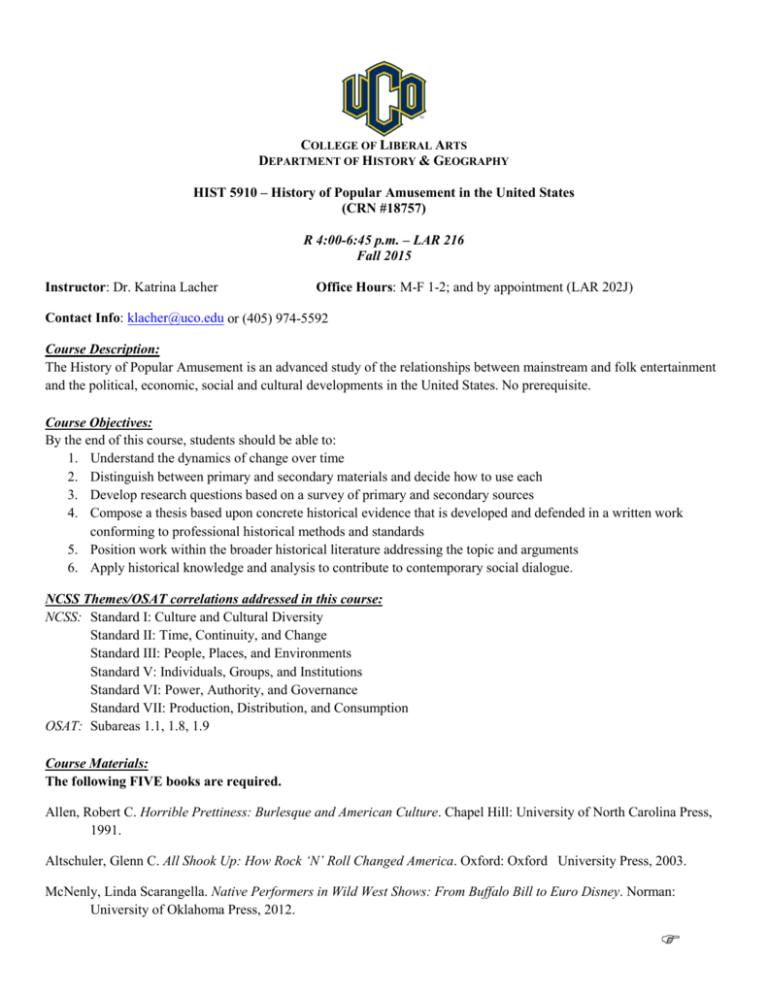
COLLEGE OF LIBERAL ARTS DEPARTMENT OF HISTORY & GEOGRAPHY HIST 5910 – History of Popular Amusement in the United States (CRN #18757) R 4:00-6:45 p.m. – LAR 216 Fall 2015 Instructor: Dr. Katrina Lacher Office Hours: M-F 1-2; and by appointment (LAR 202J) Contact Info: klacher@uco.edu or (405) 974-5592 Course Description: The History of Popular Amusement is an advanced study of the relationships between mainstream and folk entertainment and the political, economic, social and cultural developments in the United States. No prerequisite. Course Objectives: By the end of this course, students should be able to: 1. Understand the dynamics of change over time 2. Distinguish between primary and secondary materials and decide how to use each 3. Develop research questions based on a survey of primary and secondary sources 4. Compose a thesis based upon concrete historical evidence that is developed and defended in a written work conforming to professional historical methods and standards 5. Position work within the broader historical literature addressing the topic and arguments 6. Apply historical knowledge and analysis to contribute to contemporary social dialogue. NCSS Themes/OSAT correlations addressed in this course: NCSS: Standard I: Culture and Cultural Diversity Standard II: Time, Continuity, and Change Standard III: People, Places, and Environments Standard V: Individuals, Groups, and Institutions Standard VI: Power, Authority, and Governance Standard VII: Production, Distribution, and Consumption OSAT: Subareas 1.1, 1.8, 1.9 Course Materials: The following FIVE books are required. Allen, Robert C. Horrible Prettiness: Burlesque and American Culture. Chapel Hill: University of North Carolina Press, 1991. Altschuler, Glenn C. All Shook Up: How Rock ‘N’ Roll Changed America. Oxford: Oxford University Press, 2003. McNenly, Linda Scarangella. Native Performers in Wild West Shows: From Buffalo Bill to Euro Disney. Norman: University of Oklahoma Press, 2012. Sirota, David. Back to Our Future. New York: Ballantine Books, 2011. Taylor, Yuval. Darkest America: Black Minstrelsy from Slavery to Hip-Hop. New York: W.W. Norton & Company, 2012. AND: Choose ONE of the following: Hanley, Tim. Wonder Woman Unbound: The Curious History of the World’s Most Famous Heroine. Chicago: Chicago Review Press, 2014. OR Lepore, Jill. The Secret History of Wonder Woman. New York: Vintage Books, 2014. [You will read a total of SIX books.] No other supplies are required; however, you will want to bring a notebook or binder and pen/pencil to every class meeting. With instructors’ approval, laptops/tablets/iPads may be used for note taking. Grading Criteria: • Reaction Papers and Book Discussions (100 pts each – 600 points total) – We will read six books through the course of the semester. The due dates for each book are listed below. For each book, you will complete a reaction paper. Reaction Papers are due AT THE BEGINNING of class on the dates listed. The paper along with the discussion will be graded. The purpose of these assignments is to read, write, and think critically. The template can be found on our course D2L site (learn.uco.edu). • Research Paper Project (400 points) – This is an upper-division, reading and research course. We will devote a significant portion of the semester to developing an original research paper based on primary and secondary sources. o Requirements: Use and properly cite at least 10 primary sources and 5 secondary sources Footnotes; Chicago 16th edition 10-12 pages; standard margins; Times New Roman 11- or 12- point font; double spaced Bibliography o Due Dates: Research Paper Prospectus due September 3rd • 25 points • Minimum 1 page; standard margins; typed; Times New Roman 11- or 12- point font • double spaced • Your prospectus should clearly identify your proposed research topic, provide a brief historical context, and offer at least three potential research questions you hope to address. Working Bibliography due September 24th • 25 points • Typed; Times New Roman 11- or 12- point font • Chicago citation style • By this point, at minimum, you should have 5 primary sources and 3 secondary sources. Divide your bibliography into at least two sections: Primary and Secondary. Detailed Outline with Thesis due October 8th • 25 points • Typed; standard margins; Times New Roman 11- or 12- point font • Your outline should exhibit intentional planning. Italicize your thesis in your introductory section. Show how you will build your argument and construct your paper. • • Brief In-class Presentation – December 3rd • 25 points • Share your research findings with our class in a 5-10 minute oral synopsis. Final Draft due December 3rd (we do not have a final exam in this class – the research paper will be submitted in lieu of a final exam) • 300 points • Use and properly cite at least 10 primary sources and 5 secondary sources • Use footnotes (not endnotes); Chicago 16th edition • 10-12 pages; standard margins; Times New Roman 11- or 12- point font; double spaced • Bibliography attached to same document GRADUATE STUDENT ASSIGNMENT: Comparative Analysis Paper (100 points) – You will write an essay analyzing seven scholarly works relating to the history of popular amusement. You must incorporate the six monographs we read together as well as an additional book of your choosing (with consultation and approval of the instructor). You must discuss your seventh book selection with me by September 17th. In your essay, consider comparing the methods and sources each author used, the backgrounds of each author, their topic selection, etc. Avoid discussing each book individually – examine what themes and methodologies overlap amongst the diverse books. Discuss the state of the field of the history of popular amusement and feel free to prognosticate as to where the field may go in the future. Paper must be 10-12 pages, typed. Due by Thursday, December 10th by 3 p.m. Attendance, Group Work, and Participation – Attending and engaging in class meetings is essential to success. More than one unexcused absence and/or habitual tardiness will result in a 10% deduction of your final grade. Total points available – 1100 A: 1100-990 B: 989-880 C: 879-770 NOTE: I will not accept late work. Reaction Papers and other work that are not turned in by the designated date will earn a grade of 0. D: 769-660 F: <659 Class Policies: 1. Be respectful of your classmates, your instructor, and yourself. Arrive to class on time and do not leave early. Turn cellphones off. Do not text, Facebook, Tweet, etc. during class. You will be asked to leave and you will not be permitted to make up that meeting’s assignments. 2. Plagiarism and other forms of cheating will not be tolerated. Do your own work. All written assignments may be subject to submission for textual similarity review via Turnitin.com. “UCO subscribes to Turnitin.com plagiarism prevention service. Students agree that by taking this course, all required assignments may be subject to submission for textual similarity review to Turnitin.com for the detection of plagiarism. All submitted assignments will be included as source documents in the Turnitin.com restricted access reference database for the purpose of detecting plagiarism of such assignments. Use of the Turnitin.com service is subject to the Terms and Conditions of Use posted on the Turnitin.com website. Turnitin.com is just one of various plagiarism prevention tools and methods which may be utilized by your faculty instructor during the terms of the semester. In the UCO Student Handbook, there is a process for contesting any plagiarism allegations against you.” 3. For information on University policies, please consult UCO Academic Affairs’ Student Information Sheet: http://www.uco.edu/academic-affairs/files/aa-forms/StudentInfoSheet.pdf Transformative Learning: The study of history provides a unique laboratory to experiment with and implement the cornerstones of Transformative Learning. Students who engage in our course will gain discipline knowledge through course projects, discussions, and assessments. Not only will students study the characteristics and accomplishments of past leaders, but they will also have an opportunity to apply leadership skills in class through historical debates and role play. As students evaluate primary sources and piece together the story of our past, they will directly engage in research and problem solving. Through the course of the semester, we will read and react to current events articles in the New York Times. Such civic engagement aims to show students the interconnectedness and immediacy of history. Though the course charts the history of popular amusement in the United States, we will also analyze how the nation and its people interacted with the rest of the world and with each other. Cultivating global and cultural competencies through a meaningful analysis of past relationships, students should be better able to navigate an increasingly global and complex world. Through an intellectual and cultural examination of disease, medicine, and diet, the class will compare links between past visions of health and wellness and choices we make today. Ultimately, the discipline of history offers an ideal environment to engage the Central Six. Embrace the opportunity to better understand the world around you. Embrace your curiosity. Disability Accommodation: The University of Central Oklahoma complies with Section 504 of the Rehabilitation Act of 1973 and the American with Disabilities Act of 1990. Students with disabilities who need special accommodations must make their requests by contacting Disability Support Services, at (405) 974-2516. The DSS Office is located in the Nigh University Center, Room 309. Students should also notify the instructor of special accommodation needs by the end of the first week of class. DATE TOPIC 8/20 Welcome and Introductions WHAT’S DUE 8/27 Minstrelsy: Then and Now (?) Taylor Rx Paper DUE 9/3 Taming Rough Amusements Research Prospectus DUE 9/10 Building an Entertainment Industry McNenly Rx Paper DUE 9/17 Burlesque, Vaudeville, & Amusement Parks Allen Rx Paper DUE 9/24 Progressivism/Reform – The “Leisure Problem” Research Paper Working Bib DUE 10/1 Early 20th c. Pop Culture 10/8 The Culture of the Depression & Dust Bowl Research Paper Outline DUE 10/22 Building a Wartime Consensus Lepore OR Hanley Rx Paper DUE 10/29 Counterpoints to Consensus 11/5 Pop Culture & 1960s 11/12 National Malaise/Funk of 1970s 11/19 Late 20th c. Pop Culture 11/26 12/3 12/10 Altschuler Rx Paper DUE Sirota Rx Paper DUE NO CLASS - Thanksgiving Presentations Presentations & Paper DUE Graduate Students: Comparative Analysis Paper DUE by 3 p.m. “The best journeys answer questions that in the beginning you didn’t even think to ask.”
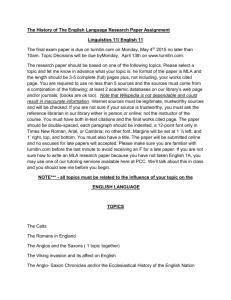
![ENG 0123: READING AND WRITING FOR COLLEGE [CRN]](http://s2.studylib.net/store/data/017863337_1-d46c88449e12611523c0c987291907bb-300x300.png)
